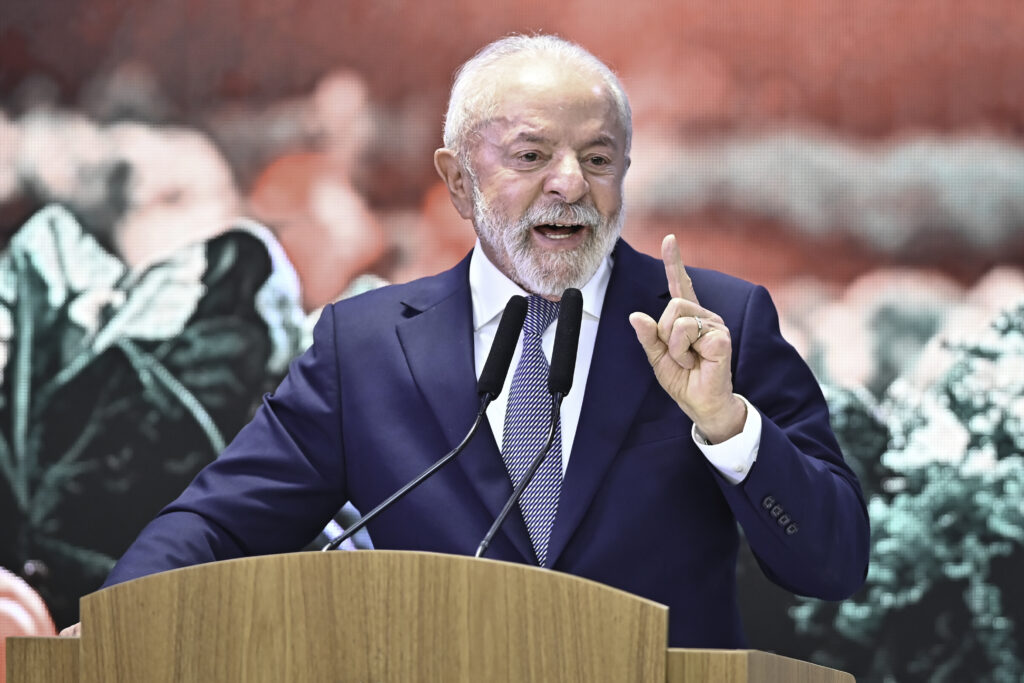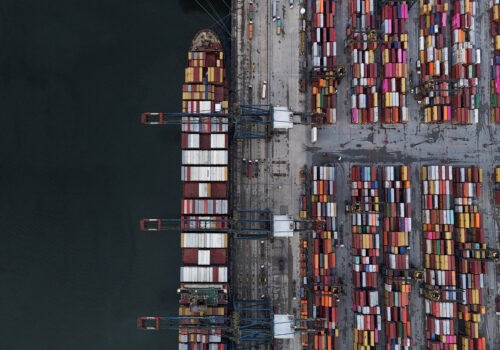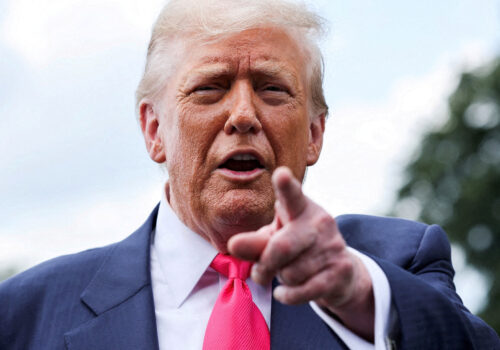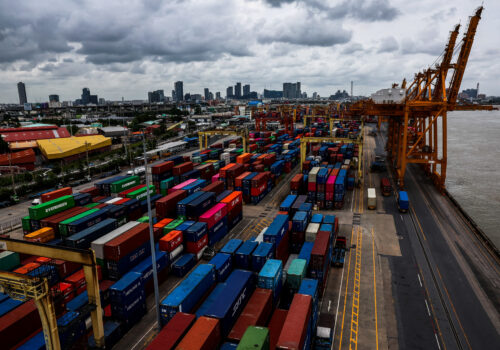US President Donald Trump is turning up the heat on Brazil, with a 50 percent tariff on many Brazilian imports to the United States that took effect Wednesday. While Brazil is being hit with one of the highest tariff rates imposed on any country, Trump is also granting 694 exceptions for approximately four thousand products. This includes Embraer aircraft, orange juice, pig iron, and petroleum—but not coffee or meat, which are two important markets for Brazil. Many Brazilian government and business leaders appear somewhat relieved with this mixed outcome, having feared it would be worse. Moreover, this outcome is potentially an opening for more exemptions and for negotiations over a reduction in the overall tariff.
In other words, nothing about this week’s outcome is taken as final. The tariff saga will continue. Already, however, it has produced some unexpected political and geopolitical consequences for Brazil. To begin with, Trump’s tariffs have not halted the trial of former Brazilian President Jair Bolsonaro for an attempted coup d’état in January 2023, as the White House appears to have hoped. Instead, Trump is encouraging a modest “rally around the flag” effect in Brazil that benefits the Lula administration, which replaced the Bolsonaro administration. That is on the political side. On the geopolitical side, the US tariffs appear to be accelerating Brazil’s turn away from the United States and toward powers such as China. Both could continue as the back and forth over the tariff rates and exemptions continues.
Brazilians turn toward Lula
Luiz Inácio Lula da Silva, the seventy-nine-year-old Brazilian president, was once called “the most popular politician on Earth” by then US President Barack Obama. However, as his four-year term reached its midpoint at the start of this year, Lula’s approval ratings had been on the decline, reaching the lowest level of his three administrations. The Brazilian economy is growing, and unemployment is falling, but the population is concerned about rising food prices and crime.
In part, this decrease could be attributed to Lula’s image frequently being linked by the opposition with that of a corrupt politician. Lula was arrested in 2018 as part of Operation Lava-Jato, a major operation conducted by the Brazilian Federal Police between 2014 and 2021 to dismantle a large money laundering scheme involving politicians and businessmen. Lula was released less than two years later after the Supreme Federal Court ruled that his imprisonment was unconstitutional. Two years later, the operation was closed after being the subject of several controversies.
Lula’s return to power in 2023 was marked by a broad democratic coalition, with the participation of various parties from across the political spectrum, amid several attacks by Bolsonaro against the Brazilian electoral system and fears that Bolsonaro was plotting a coup d’etat to remain in office. Following the inauguration of Lula on January 8, more than four thousand supporters of Bolsonaro assaulted the Presidential Palace, the National Congress, and other government buildings in Brasília. The Supreme Federal Court of Brazil classified the events as acts of terrorism. Nonetheless, opposition forces had seen their political fortunes improving late last year and early this year as they continued to paint Lula as tainted by corruption allegations.
But Trump’s tariff measures seem to be lightly reversing the downward trajectory of support that Lula was on. Data from public opinion surveys conducted after the announcement of Trump’s tariff on July 9 indicate an improvement in the image of the Brazilian president, whose approval rating has now surpassed his disapproval rating for the first time since October 2024.
According to the Atlas/Bloomberg survey released on July 31, 50.2 percent of respondents expressed approval of Lula administration, while 49.7 percent expressed disapproval. Lula’s approval number had risen from 47.3 percent in June, in the same poll. Another survey in July, by Genial/Quaest, found Lula’s approval rating increasing to 43 percent, from 40 percent in May.
A clear majority of 61 percent of voters now see Lula as representing Brazil better than Bolsonaro on the global stage, according to Atlas/Bloomberg, up from 51 percent in November 2023.
Trump appears to be a driving factor here, as 63.2 percent of Brazilians hold a negative view of the US president, according to Atlas/Bloomberg polling, an increase of 6 percentage points from April. The proportion of respondents with a positive view of the US president has fallen from 44 percent to 31.9 percent over a six-month period.
At the same time, Lula has sought to show he is standing his ground against the US president. In a July 17 national television broadcast entitled “Sovereign Brazil,” Lula emphasized the importance of defending national sovereignty, multilateralism, and dialogue between nations, though he noted that Brazil and the United States are celebrating two hundred years of cordial diplomatic relations.
“We expected a response, and what we received was unacceptable blackmail, in the form of threats to Brazilian institutions, and with false information about trade between Brazil and the United States,” Lula told Brazilians.
Lula followed this address with an interview in the New York Times on July 30. “At no point will Brazil negotiate as if it were a small country up against a big country,” he said. “We know the economic power of the United States, we recognize the military power of the United States, we recognize the technological size of the United States. . . But that doesn’t make us afraid. It makes us concerned.”
With just over a year to go before the presidential election, scheduled for October 2026, Lula’s government has been riding a wave of positive reviews amid threats from Trump. The Supreme Court has ruled that Bolsonaro is ineligible to run for office until 2030, citing allegations of abuse of political power and misuse of the media. Lula has already stated that, should it be deemed necessary, he will run for a fourth term.
Brasília turns away from Washington
In contrast to Brazilians’ deteriorating view of Trump, there has been an improvement in their views about China and its leader, Xi Jinping. According to a survey conducted earlier this year by the Pew Research Center, Brazilians’ confidence in China as the world’s leading economy rose from 30 percent in 2023 to 36 percent in 2025. Over the same period, confidence in the United States fell from 42 percent to 40 percent.
As Trump intensifies his actions, this could accelerate Brazil’s strategic recalibration toward China, the country’s main trading partner since 2009. For its part, China appears aware of this opportunity. On Wednesday, during a telephone conversation with Celso Amorim, Lula’s advisor on foreign affairs, Foreign Minister Wang Yi said that China “firmly” supports Brazil in defending its national sovereignty and dignity, and it opposes “unjustified interference in Brazil’s internal affairs.” Without mentioning the United States or Trump by name, Wang said that Beijing also supports Brazilians in resisting what he termed “abusive tariffs.”
“Unity is strength,” the Chinese Embassy in Brazil published in a post on X the same day.
In an earlier interview with the Financial Times, Amorim stated that Trump’s criticisms are strengthening Brazil’s relations with the BRICS nations, emerging economies that include Russia, India, and China. Brazil’s aim is to achieve greater diversification and reduce reliance on any single country. Amorim also expressed a desire to enhance relations with countries in Europe, South America, and Asia. Many economists view the current moment as a significant opportunity to facilitate a European Union-Mercosur trade deal, for instance.
While there may be further ups and downs to come in Brazil-US trade negotiations, Brazil’s public opinion and government policy is steadily moving in one direction—and it’s not toward Washington.
Thayz Guimarães is a nonresident journalist fellow in the Atlantic Council’s Global China Hub and an international reporter for O Globo.
Further reading
Thu, Jul 17, 2025
The numbers that define the US-Brazil trade partnership
New Atlanticist By Valentina Sader, Ignacio Albe
The US president has threatened to impose a 50 percent tariff on Brazil in August. Before then, take a deep data dive into the current bilateral trade relationship.
Fri, Aug 1, 2025
How Donald Trump remade global trade
New Atlanticist By Josh Lipsky
The US president has smashed the system, but the speed and scale of the smashing owes to a system that had been growing increasingly brittle for years.
Fri, Aug 1, 2025
What to watch as Trump ratchets up global tariffs
Fast Thinking By
US President Donald Trump will raise tariffs on nearly every US trading partner. Atlantic Council experts take stock of what this means for the global economy.
Image: In Brazil, on August 5, 2025, President Lula da Silva talks about the tariffs that President Trump will apply to Brazil on Wednesday. (Photo by Ton Molina/NurPhoto) REUTERS



